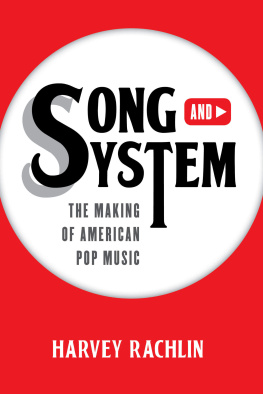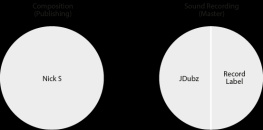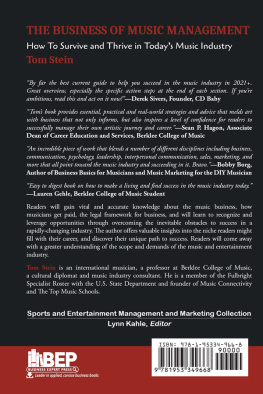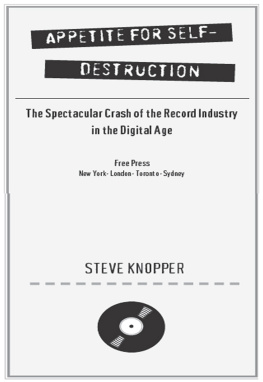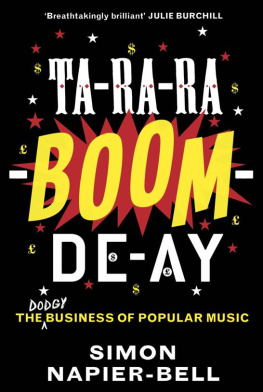
Also by Fred Goodman
The Secret City: Woodlawn Cemetery and the Buried History of New York
The Mansion on the Hill: Dylan, Young, Geffen, Springsteen, and the Head-on Collision of Rock and Commerce
FORTUNES
FOOL
EDGAR BRONFMAN JR., WARNER MUSIC,
AND AN INDUSTRY IN CRISIS
FRED GOODMAN


Simon & Schuster
1230 Avenue of the Americas
New York, NY 10020
www.SimonandSchuster.com
Copyright 2010 by Fred Goodman
All rights reserved, including the right to reproduce this book or portions thereof in any form whatsoever. For information address Simon & Schuster Subsidiary Rights Department, 1230 Avenue of the Americas, New York, NY 10020.
First Simon & Schuster hardcover edition July 2010
SIMON & SCHUSTER and colophon are registered trademarks of Simon & Schuster, Inc.
For information about special discounts for bulk purchases, please contact Simon & Schuster Special Sales at 1-866-506-1949 or business@simonandschuster.com.
The Simon & Schuster Speakers Bureau can bring authors to your live event. For more information or to book an event contact the Simon & Schuster Speakers Bureau at 1-866-248-3049 or visit our website at www.simonspeakers.com .
Designed by Jill Putorti
Manufactured in the United States of America
10 9 8 7 6 5 4 3 2 1
Library of Congress Cataloging-in-Publication Data is available.
ISBN 978-0-7432-6998-8
ISBN 978-1-4391-6050-3 (ebook)
To Our Lady of Perpetual Revisions, Ruth Fecych. My patron saint.
Contents
The great American drama is the clash of adolescence with middle age.
Frank McCourt, Teacher Man
Im not sure if music got a future. We have all these electronic ways to download and steal music and get music, but theres no money in makin music. That moneys startin to dry up. So whats gonna happen in twenty years, twenty-five years, when the new artists of the day are all, There aint no money in music, so Ima go use my creative talents to do something else? World never hears of great talent, because its all dried up. Now what are you gonna put on your iPod? Now what are you gonna download, when theres nobody making music?
Ice Cube, interviewed by Nathan Rabin for
The Onions A.V. Club, January 16, 2008
PROLOGUE
The Opening Bell
Wednesday, May 11, 2005
Edgar Bronfman Jr. is famous for two things; one annoying and the other unforgivable. The annoying thing is that though he was born rich as Croesus, he has opted to work hard every day. The unforgivable thing is that he managed to lose $3 billion while doing so.
Today is the first day of public trading in the stock of the Warner Music Group (WMG), the troubled recording and music publishing company that Bronfman purchased a little over a year ago from Time Warner with a group of private equity investors. As the new companys chairman and CEO, Edgar is here to ring the exchanges opening bell. He is also here to get back some of his money and all of his pride by becoming the man who saved the embattled music business.
The record industry has become the canary in the internet coal mine. It is the first commercial medium to feel the gale force of cyberspace, and the entire business, including the Warner Music Group, has been blown off its foundation. The industry faces the most basic questions about its futurenot just how it will price, distribute, and control its product in the digital era, but whether it even has a future in a world remade by file trading and rife with free digital copies of virtually any recording. Indeed, no one can say with certainty that artists and performers will continue to need or even want record companies. Because of the internet, all bets are off. Warner is literally in a fight for its life.
Despite a well-known passion for the entertainment business, Edgar is a most unlikely candidate for savior. The heir to the Seagram liquor fortune, he skipped college to pursue a career as a theater and film producer, and when he followed his father and grandfather as the chairman of the family-controlled and publicly traded company, he acted on those interests and recast the liquor giant as an entertainment company. In 1995, he purchased MCA, and then two record companies, Interscope and PolyGram. The controversial strategy split the Bronfman family into warring factions and polarized Wall Street, where investors who had liked Seagram for its regular dividends decried the moves, and those who predicted the internet would bring new value to intellectual property, like films and recordings, embraced them. The debate became moot when Edgar orchestrated one deal too many by merging with Frances would-be media giant Vivendi, a decision that quickly reduced the family empireand its shareholder valueto rubble.
The Vivendi disaster was as high-profile a humiliation as any businessman not sent to prison is likely to endure. The normally circumspect New York Times crowned Bronfman .
Edgar claims the failed venture barely scuffed the Bronfman fortune. everybody he deals with knows it. He is like Dylans Napoleon in ragsstripped of not just his army but also his mystique. The Warner Music Group is how he will get back up. When he succeeds, it will be sweet revenge and a rehabilitation as public as his downfall. Except this isnt a slam dunk.
Bronfman is wagering that a reinvention and turnaround isnt up for grabs but an eventuality. In his view, the downloading and the explosion in freely traded music that shrank worldwide CD sales from $38 billion in 1999 to $33.6 billion in the five years before he purchased the Warner Music Group can be turned into a money fountain by creating new internet products that are superior to free music files. When asked if record companies can get the genie back in the bottle, Bronfman holds up a bottle of water. I believe these libraries will be fundamentally revalued, just as video did for TV and film, he has been telling potential investors. Cell phones, iPodsI think it all cuts very favorably for a company like ours.
Thats hardly the way things have played out so far. The internet storm caught the record business off guard, and in no way has it exhibited the fortitude, imagination, or strategic planning needed to adapt to the new and evolving environment. Its best managers have the skills to find, record, and promote musicand thats all. Edgar will have to change that.
Bronfman doesnt consider himself a record executive so much as a special breed of money man. Whatever mistakes he made at Seagram, Edgar has learned to read between the lines of a balance sheet as well as his equity partners, and he knows enough about the quirks of the music business to be expected to make good hires and thoughtful investments. Hes a manager and investor with an understanding and passion for both the art and commerce of music who is prepared to lead the search for a new way of doing business by being the bridge between the financial world and the record executivesthe heart between the head and the hands. For WMG to survive, he has to assemble and direct a team of executives who can be more than traditional record men.
To lead the record operation, he has chosen Lyor Cohen, the former president of Def Jam Records. Cohen is a controversial choice considering the difficult challenges Warner Music faces. He became rich and successful by mastering the old and increasingly irrelevant industry system that rewards executives for chart success and market share, but he is neither wildly creative nor an iconoclast in the mold of Def Jams two other well-known executives, Rick Rubin and Russell Simmons. He isnt tech-savvy enough to program his own smart-phone, let alone craft an internet delivery system for music. What he is, is intimidating and rapacious, and he has created exceptionally focused and effective labels. But Bronfman is betting that Lyors hunger for power, recognition, and more money, and his willingness to do anything to win, makes him the man for the job.
Next page

